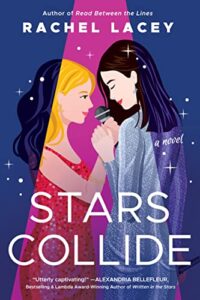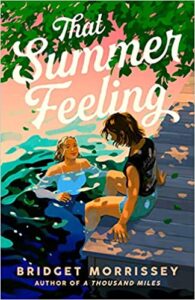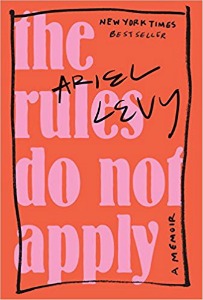“You’re more than your sexuality. So much more.”
After her divorce, pop star sensation Eden Sands’ latest album lacked the spark fans and the industry have expected of her after 20 years. Meanwhile, Anna Moss, her fellow Grammy nominee, is beginning to rise, though people in the industry don’t take her as seriously as she hoped. To rekindle that spark, Eden invites Anna to join her on stage during her Grammy performance, only for fans to focus on the spark between them. Following the unexpected popularity of #Edanna, Eden invites Anna to open her upcoming tour. The more time they spend together, the more they realize that chemistry exists off-stage, too. Is there something more to what they’re feeling?
Mild Spoilers Ahead. Book Contains Sexual Scenes.
Rachel Lacey does a wonderful job at exploring topics of self-discovery and identity. Eden and Anna’s love story gives a respectable nod to many realities of life as a celebrity. As a young star, Eden is forced to mature quickly. Allowing the adults in her life to make major decisions on her behalf stole Eden’s control, leading her to claim that control in extreme ways as an adult. Fans have mobbed Eden, tugging at her hair, getting in her personal space, and claiming some unspoken right to flash cameras in her face, leading Eden to further seclude herself under the guise of safety. So much of her young life was controlled that she lost the chance to explore her identity beyond the pop star on stage. Meanwhile, Anna is forever seen as a teen character she played (while in her 20s), prompting no one to take her seriously. One of the things I loved most about this book was the mentorship between the two women. While Eden helped Anna recognize the control she could have over her career, Anna helped Eden recognize who she was and the life she could have outside of the spotlight. A lot of the conflicts in this story were internal; Eden’s self-discovery and sexual awakening, the words of a controlling and toxic ex haunting Anna. Eden and Anna helped one another through their self-growth.
In my favorite scenes, Anna coaxes Eden to talk through her thoughts (finally, a sapphic book that avoids using miscommunication to simmer the story in tension). Anna reminds Eden, “You don’t have to label yourself before you’re ready… or ever, if you don’t want to. How you identify is so personal, and you’re under no obligation to share it with anyone.” For many people, recognizing who they are—labels or not—is a lonely process. Anna never pushes or rushes Eden, but she does help Eden work through her concerns. You’re never too late to decide who you are. I didn’t navigate my own sexuality until after college, but I wish I’d had a friend to help me understand it, the way Eden had Anna. Even when their relationship blossoms into more, their friendship never wavers. Rachel Lacey does an incredible job at describing how out of tune you can feel for so much of your life, only for the static to clear because of an event, a realization, or a person. I’ve met that person and I can say with certainty that it can change everything.
Though I loved the internal conflicts both main characters had to navigate to mature and develop, the lack of strong external factors seems unrealistic. The major external factors are the mobbing fans and Anna’s ex; the latter of which creates the only major blow-out scene in the entire novel. While we see Anna mature throughout the story (both in how she treats Eden and in her career growth), her maturity unravels in that scene. Eden, who is usually steadfast in her composure, steps beyond the professional veneer she wears in a moment of immature jealousy. That scene, presented in the last few chapters, felt like a rushed, inserted source of conflict before a HEA ending. Even Anna’s ex felt out of character in these scenes, jumping from one extreme to the next, brought in as a last-minute trigger for Anna’s insecurities about her relationship with Eden. There were other external conflicts to explore that would have strengthened the story. For example, the media is never posed in a negative light (as if the media wouldn’t distort the truth or paparazzi wouldn’t mob both popstars). What if Eden was only enamored by the situation (a concern that could have crept alongside Anna’s other doubts)? During the second half of the novel, Eden and Anna were surrounded by so much BLISS that I kept waiting for a real problem to challenge their relationship. The strongest relationships navigate problems and survive, all the stronger for it.
Recommended to anyone in need of a warm and fuzzy romance read. Ideal for fans of sexy slow burns, workplace romances, and celebrity romances.
✨ The Vibes ✨
👩❤️👩 Lesbian and Pansexual Main Characters
💞 Sapphic Romance
🎤 Workplace Romance / Forced Proximity
🎙️ Dual POV
🎵 Slow Burn
⌛ Age Gap
💗Friends to Lovers
🏳️⚧️ Transgender Rep
❤️🔥 Sexual Awakening
🌶️ Spice



